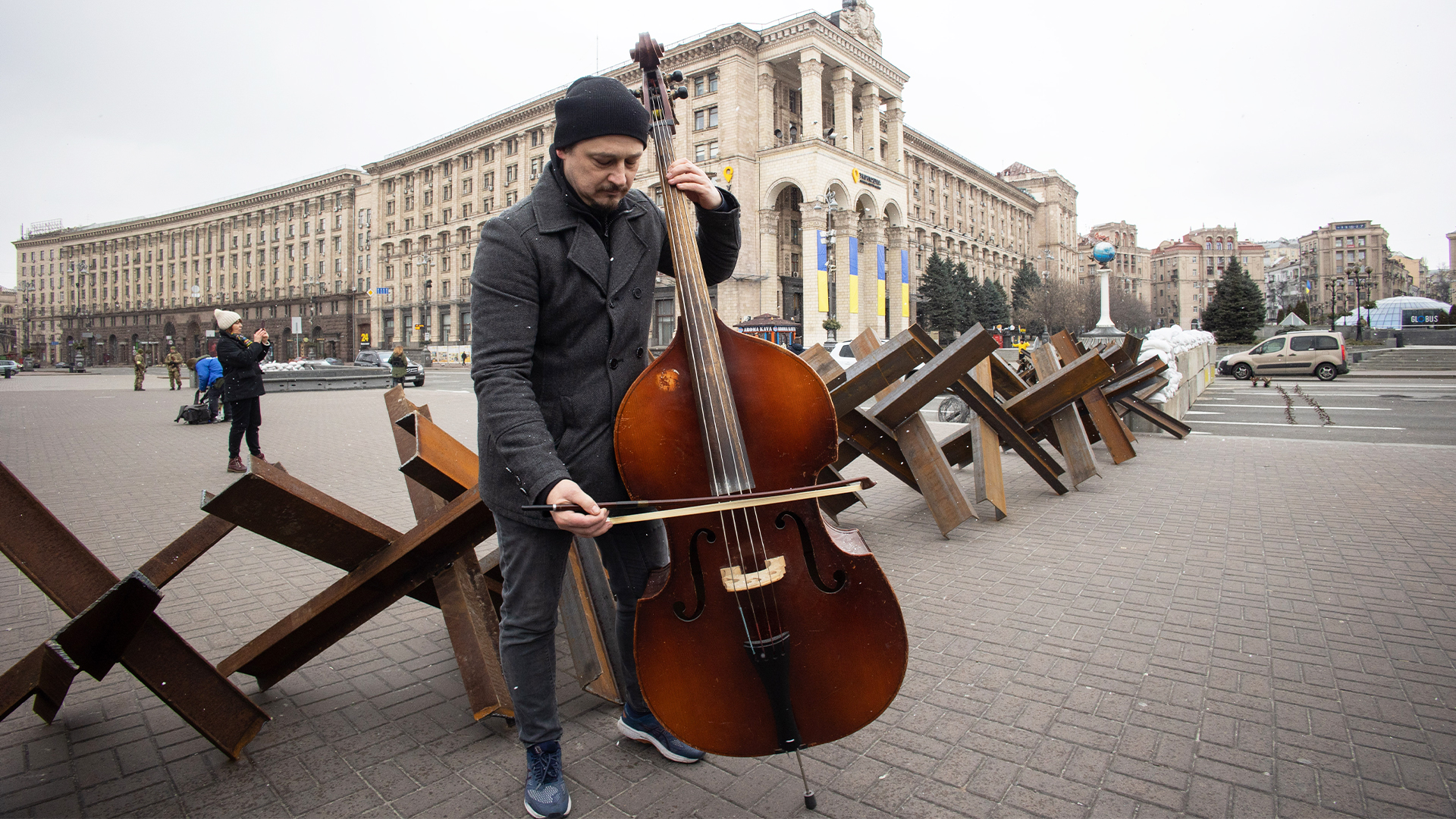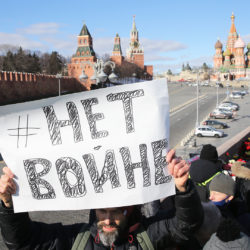
Ukraine’s music reveals the past and points to the country’s future
Maria Sonevytsky, an ethnomusicology researcher, discusses how Ukraine’s rich musical traditions are bound to sovereignty and national identity
BY MARIAM KIPAROIDZE
22 MARCH, 2022
Q&A
One of the core beliefs of Russian leadership about Ukraine is that the country’s claims on nationhood are baseless. That “Ukraine is a muddle not a state,” as the Kremlin’s former chief ideologist, Vladislav Surkov, has said. These claims rely on historical exaggerations, gross mythmaking, dangerous distortions, false pronouncements, and outright fictions.
Maria Sonevytsky’s work has something to say about that. She has been studying Ukrainian national identity and Ukraine’s historical music for years. A professor of anthropology and music at Bard College, she is the author of Wild Music: Sound and Sovereignty in Ukraine. In a conversation edited for length and clarity, she spoke to me about how Ukraine’s musical inheritance can provide context and insight into Ukrainian history and national identity.
Tell me about your work in Ukrainian music and how it helps shed light on the current situation.
I decided that I wanted to divide my research between Crimea and western Ukraine.
And what I started observing was that many people had very complex feelings about whether they wanted Ukraine to go in the direction of the European Union or Russia. Everyone I spent time with was not in favor of going toward Russia, but they were also critical of the European Union. They didn’t have simple ideas that Europe was some sort of utopia. I saw this expressed constantly through music.
My project started because Ruslana, a Ukrainian pop star, won the Eurovision Song Contest in 2004. It was a really big deal for some people. They believed, “Uh-huh! Finally, we can show that Ukraine is part of Europe.” For others, it was very embarrassing. They said, “Eurovision is kitsch, and this is not how we want our Ukraine to be defined.”
It became a very fascinating glimpse into just how complex it is to think about how people want to position themselves. So music became a lens through which I could view how culture was, in some ways, imagining a future for Ukraine.
Why is this important?
I think that’s so important, especially when we’re talking about traditional music. I’m usually writing about some sort of hybrid music that uses a combination of traditional gestures with popular music forms. But even when we’re talking about just traditional music, these are all also forward-facing. They’re expressing a wish for the future — even if just a wish for the survival of a past.
Right now, what we’re seeing is not only a denial that Ukraine has a past, but a rejection on the part of the Russians that there could be a Ukrainian future. And these musicians are saying, “No, we have a past and we are projecting it also into the future.”
It’s not a simple history. It’s a very complicated history. Ukraine has had a very complicated relationship to its project of statehood, as do many other countries around the world, including Russia. But Ukrainian history exists and we can actually hear it if we listen to the history of Ukrainian music.
Your book discusses how music got dragged into Russia’s propaganda on Ukrainian nationalists and Nazis. Could you tell me more about that?
There’s one chapter in the book about the Maidan revolution, the band called The Dakh Daughters, and their performance of a song, that they did not want to claim had politics, but they performed it during the revolution and sure enough, the Russian internet immediately started calling them neo-Nazis, neo-fascists.
This is about how Ukrainians are not allowed the possibility of existing as anything but nationalists, that Russian propaganda does not let them have any agency outside of nationalism. And the Dakh Daughters are a clear example of a group that actually wanted so much not to be pigeonholed as Ukrainian musicians. They wanted to be just musicians, they didn’t want to have to serve the state. But they did want to show their support. They ended up performing this quite apolitical song and immediately were called neo-fascists.
If you know the Russian playbook, this is a very old strategy, it goes back to the Russian Empire and it was prevalent in the Soviet Union as well.
What has surprised you the most in your study of how Ukrainian musicians think about Ukraine’s history?
I’m writing a book on the late-Soviet Ukrainian rock scene and specifically in Kyiv. And I’m writing about the first Ukrainian punk rock band to sing in Ukrainian, Vopli Vidopliassova.
They are all Russian-speaking, and as one of the members told me, they all grew up in the “Russkiy Mir” [Russian world]. They started singing in Ukrainian, and they claimed that at the time, it really wasn’t a political statement. They just thought it sounded cool. And they were making fun, in some ways, of the stereotypes of Ukrainians as these kind of hopeless hillbillies.
Most of the band members have now switched to speaking only in Ukrainian for different reasons. In one interview, [a band member] came to understand himself as a formerly colonized subject in a way that he did not understand himself to be in the 1980s. In the 1980s, he really just thought of himself as a punk rocker in Kyiv and wasn’t really that concerned about Ukrainian identity. But in the 1990s, when he started learning about the history of Ukrainian poets who had been repressed and reading the books that had been censored, he started understanding that some of this internalized feeling of inferiority had been part of a colonial campaign.
This has been really poignant for me, to hear these people as they learn and understand the degree to which Ukraine has been targeted by deliberate campaigns that say they have no history of their own, that they have no culture of their own.
I’ve always asked myself, is it fair to think about Ukrainians as colonized people? There’s no question they were in the Russian Empire and the Austro-Hungarian Empire. Yes, these were colonized peoples, but they were divided between empires. The Soviet Union is a much more complicated case. It wasn’t exactly an empire. And of course, Ukrainians were central in leading it at times.
What songs have you been thinking about as you watch the war in Ukraine?
One of the songs I’ve been thinking about a lot lately is the song “1944” by Jamala, a singer with Crimean Tatar heritage and who has crossed the border with her children, but whose husband has remained behind to defend their home.
When she wrote and performed it in 2016, it was really a plea to understand the plight of Crimean Tatars after the forced occupation of Crimea. And now it’s become a plea to understand the plight of the whole of Ukraine.
I’ve been thinking a lot about Taras Kompanichenko, who has been a key figure in the revival of 17th-to-19th century repertoires. He is now serving in the army and playing music to boost morale for Ukrainian soldiers.
And I’m thinking about very ordinary musicians, non-celebrities, who are playing music on the streets of Odesa or on the streets of Kyiv in defiance of this unjust war. I think these ordinary acts of defiance, these people playing music on the streets as they’re surrounded by barricades and sandbags, have been incredibly moving to watch.

Mariam Kiparoidze is a reporter/producer at Coda Story.
Get in touch via mariam@codastory.com@mariamkiparoize
Related Articles

How Ukrainian writers have experienced the war in Ukraine
MARIAM KIPAROIDZE

The Kremlin forces schools and theaters to uphold Putin’s invasion propaganda
ALEXANDRA TYAN

A photographer of Ukrainian beauty turns her lens on war to create heartbreaking juxtaposition
KATIA PATIN

How Ukrainian writers have experienced the war in Ukraine
MARIAM KIPAROIDZE

The Kremlin forces schools and theaters to uphold Putin’s invasion propaganda
ALEXANDRA TYAN

A photographer of Ukrainian beauty turns her lens on war to create heartbreaking juxtaposition
KATIA PATIN
No comments:
Post a Comment